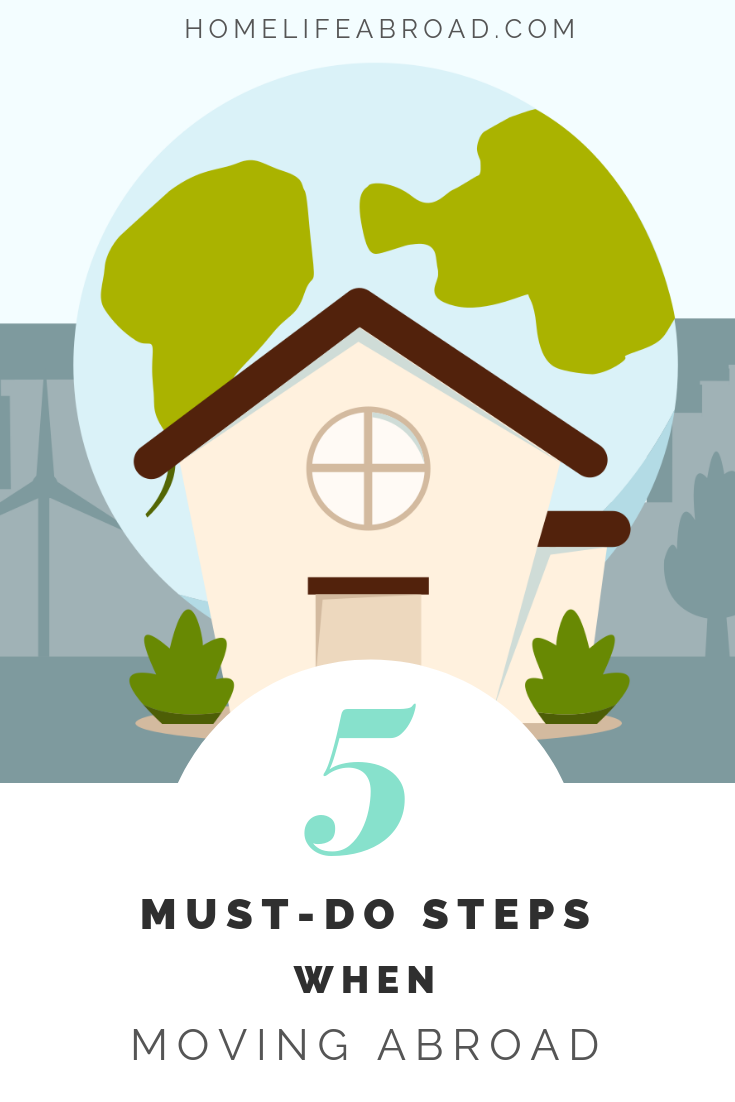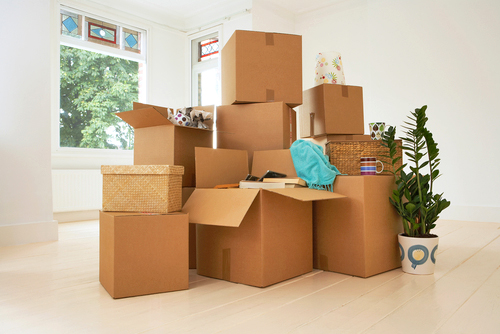Moving abroad can be an exciting adventure: new places, new views, new people, cultures, and traditions.
But before you make the big move, there will be many tasks and responsibilities to handle. After all, you’re moving to a whole other part of the world!
If you’re soon to take the ‘moving abroad’ plunge, now is the time to consider everything that needs to get done.
With that in mind, these are 5 steps that you haven’t considered that will make your move that much easier.

Pin it!
1) Prepare to sell and throw

Unlike moving across cities or states, moving abroad usually isn’t accompanied by the traditional moving trucks transporting all your furniture and belongings.
As a matter of fact, it’s often cheaper to buy new furniture than shipping your own across borders to other countries. Still, there are always going to be items that will need to go with you, so working with reliable long distance movers will be essential.
What that means for your family is that you’re about to learn just how much junk you have collected throughout the years – most of it being trash.
Try to get rid of what you can through garage sales, donations, and gifts so useful items can find a new home.
Anything else unfortunately needs to go to the dump, which means you will need to rent a dumpster. Your trash should include appliances, drywall, anything that needs to be removed from the garden, and of course, all your accumulated junk that has not found a new home.
Be considerate of how much you throw out in one go – Eagle Dumpster Rental recommends not filling dumpsters past 75% capacity to avoid spillage of items into the road.
2) Research everything you can

Preparation is vital in adapting to your new life in a foreign country.
Nowadays, most information can be found online, so use this amazing resource to find out more about what to expect in this new country.
Whether it’s important laws that you should know prior to living there to mobile plan options, it’s always best to arrive ready.
That way, you can start your life there on the right foot, rather than in confusion and despair.
Here is a short list of what you can research before your arrival:
- Mobile plans
- Laws that tend to get expat residents in trouble
- Where to live
- Background on the government, culture, language and people
- Expat communities in the region
- Activities and areas to visit with family
- Supermarkets and restaurants close to your new home
- Internet laws (some countries block sites)
- Appropriate clothing and behavior
- Hospitals with English-speaking doctors and nurses
- Contact information and location of your country’s embassy
- Health insurance
- Schooling for children
- Using your driver’s license or transferring to a local license
- Cost of living
3) Learn the basics of the local language

Even though it does function as today’s lingua franca, English is not actually as widely spoken as many think.
Many locals across the world know limited to no English, so you have to be able to communicate in their language.
Even if they do speak English, you will feel far more comfortable adapting to the area by speaking their language and communicating with them more naturally.
Use free language-learning apps like Duolingo or Spring for Rosetta Stone to learn the location’s language before you even arrive.
You may not arrive fully fluent, but you can learn the basics of the script and language. It will be of great help when you need directions or assistance.
Plus, you can enjoy entertainment like local television shows, radio, books or music.
The best part is that you can learn it for either very cheap or absolutely free!
4) Buy anything you absolutely need

Most likely, there won’t be a Target, Macy’s, or Wal-Mart a block away from your new home.
Every country has its own stores, goods, and foods that they sell – and culturally, this may be very different from what you’re used to.
If there are products, toiletries, or cosmetics that you absolutely must have in your new home, the time to buy is before you ship out.
Otherwise, you may find yourself on a wild goose hunt trying to find items that are just not sold in the country.
5) Prepare your arrival to-do list

If you thought leaving your country and house was difficult, wait till you have to deal with setting up your new home and life abroad.
Prepare everything that needs to be done upon arrival so you can get things moving fast and easily. If you are able to prepare documents beforehand, do so.
Minimize the time it takes to set up your life once you’re there – otherwise, maneuvering past unexpected bureaucracy and services can become overwhelming.
- Register with your country’s consulate or embassy. This is so they know you’re living there and can be of assistance in the event of an emergency.
. - Register with the local government. This isn’t always necessary but can be obligatory in certain countries.
. - Register your children to school. Do note that some schools require children to speak the local language fluently. Others may provide an education in English.
. - Get a mobile plan. You want to stay in touch with family, work, and the embassy upon arrival so don’t be without means of communication for long.
. - Set up internet and other services. Once you move into your new house, make sure to install internet and other services to your home ASAP. Take note that in some places, it could take weeks for the installation to take place.
. - Get a transportation card. Many cities have smart cards for traveling using public transportation. Of course, you must also know how to get around and if there are any useful public transportation apps available there, like Moovit.
. - Open a bank account. If necessary, open a bank account in the new country, particularly if you plan on living there long term, need access to local currency, and are working for a local business.
. - Get a tax expert. Many home countries, including the US, require filing tax returns in the US even for citizens living abroad and earning their salary abroad. If that’s the case for you, find an accountant who specializes in both local and your home country’s tax laws.
Thanks to Freepik for the featured image




